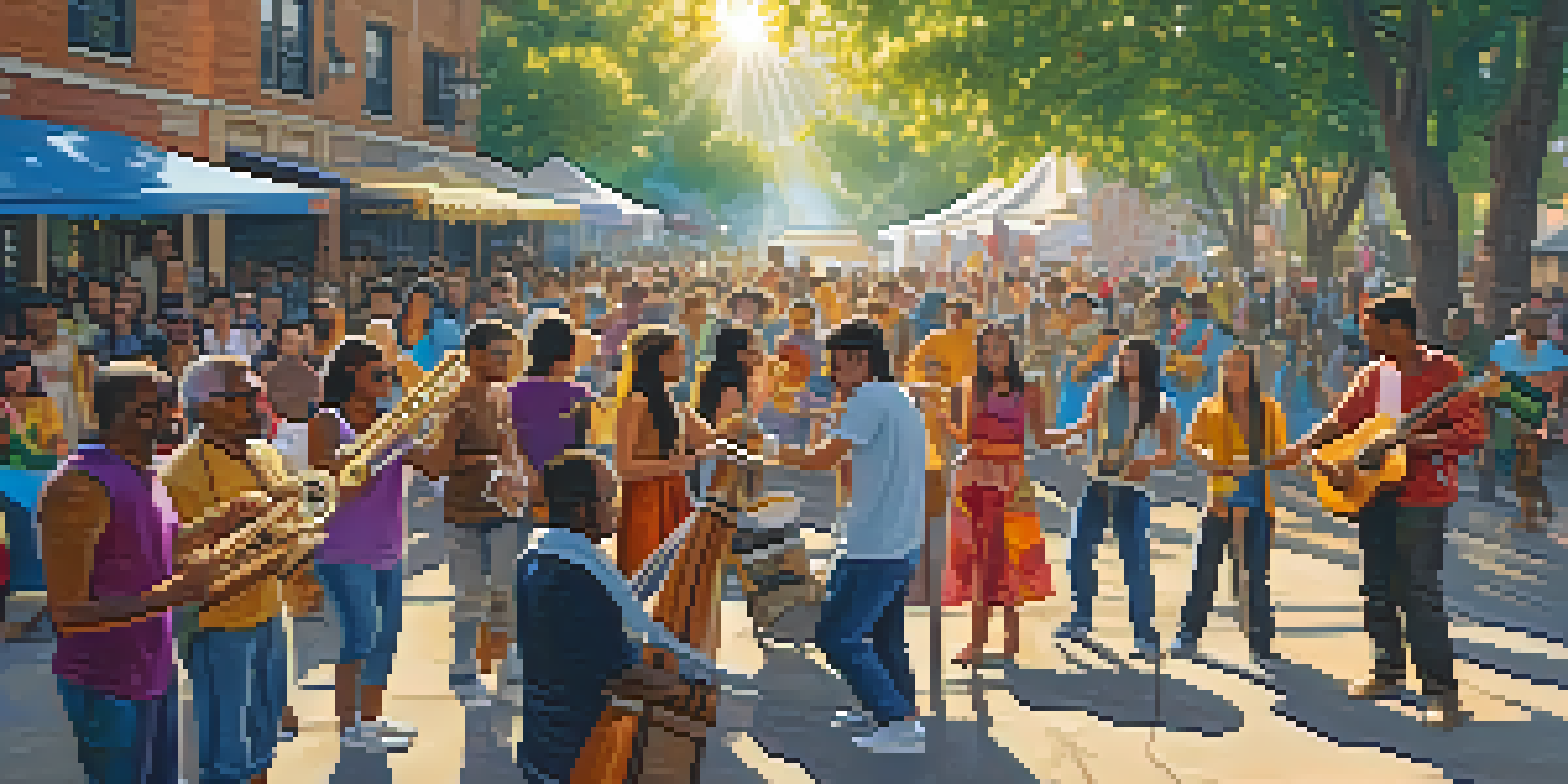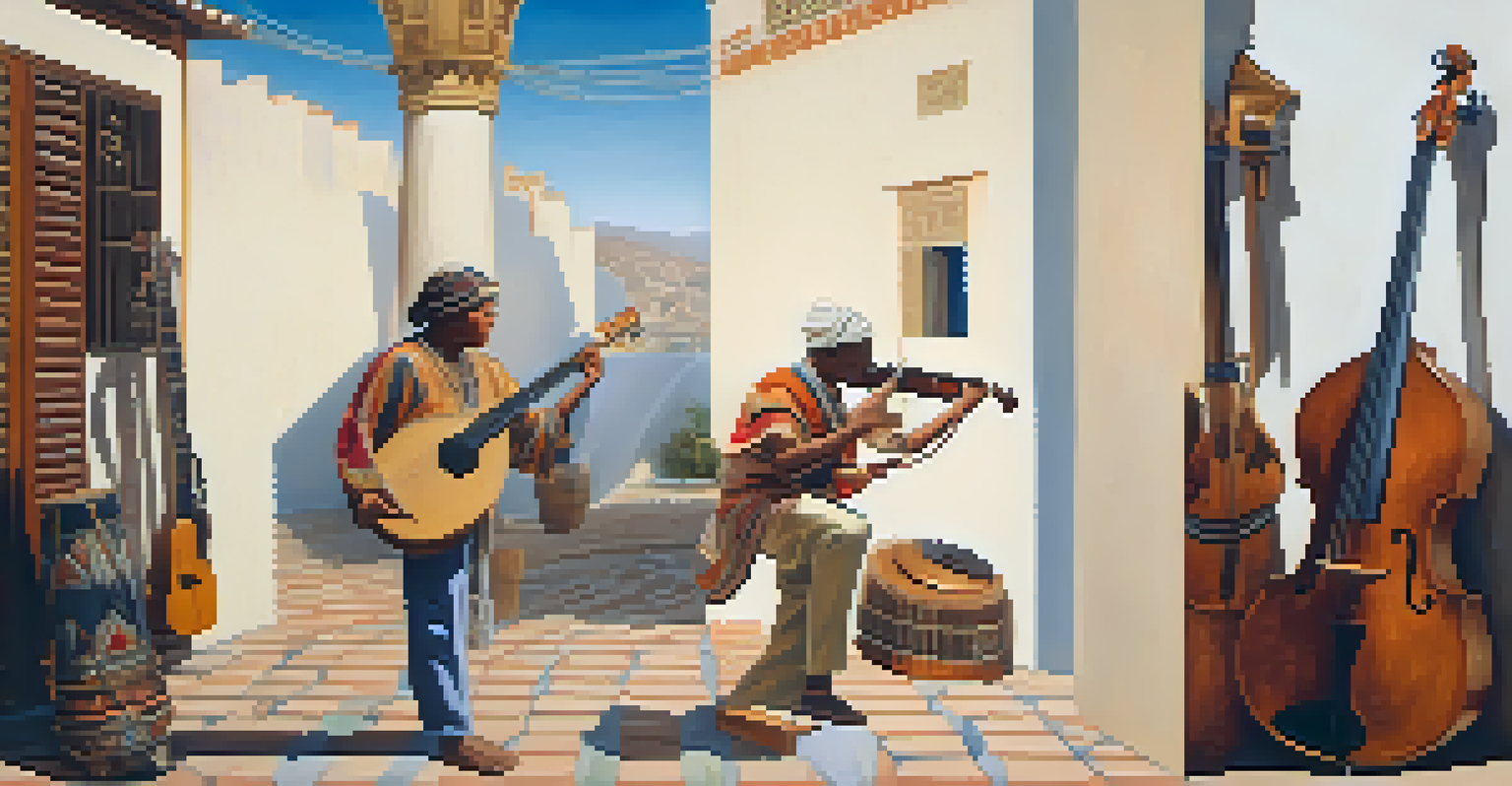Cultural Appropriation in Music: A Complex Discussion

Understanding Cultural Appropriation in Music
Cultural appropriation in music refers to the adoption of elements from one culture by artists of another, often without permission or understanding. This can include borrowing styles, rhythms, or even lyrics from marginalized cultures. While some view this as a form of appreciation, others see it as exploitation, where the original creators are overlooked.
Cultural appropriation is often seen as a form of exploitation, where the original creators are overlooked.
For example, when a popular artist incorporates traditional sounds from a lesser-known culture into their music, it can lead to a wider audience appreciating that culture. However, if the artist does not acknowledge their sources or the cultural significance behind those sounds, it can be perceived as taking without giving back.
The discussion becomes even more complex when considering the power dynamics at play. Often, artists from dominant cultures can capitalize on elements from marginalized cultures without facing the same consequences or scrutiny, raising questions about ethics and fairness.
The Fine Line Between Inspiration and Appropriation
One of the biggest challenges in this discussion is distinguishing between inspiration and appropriation. Inspiration can lead to beautiful collaborations that respect and honor the cultures involved. For instance, when musicians from different backgrounds come together to create something new, it can foster mutual respect and cultural exchange.

On the other hand, appropriation often ignores the context and significance of the borrowed elements. This can result in a superficial representation of a culture, where the deeper meanings and histories are lost. It's akin to trying to enjoy a gourmet meal without understanding the ingredients; you might miss out on the rich flavors and stories behind each component.
Cultural Appropriation Explained
Cultural appropriation in music involves adopting elements from marginalized cultures without proper acknowledgment, leading to ethical concerns.
Ultimately, the intent and impact of the artist's actions play crucial roles in determining whether an act is seen as respectful or exploitative. Artists must be mindful of how their work affects the cultures they draw from, ensuring they approach their creativity with sensitivity.
Historical Context: Music and Cultural Exchange
Music has always been a medium for cultural exchange, with genres evolving through collaboration and influence. However, it's essential to recognize that not all cultural exchanges are equal; they often occur within a historical context marked by power imbalances. For instance, genres like jazz and blues emerged from African American communities, yet later became mainstream phenomena, often stripping away the original cultural significance.
Music has always been a medium for cultural exchange, but not all cultural exchanges are equal.
In this sense, music can serve as a reflection of societal dynamics, highlighting how cultures intersect and sometimes clash. When dominant cultures adopt elements from marginalized ones, it can lead to a dilution of the original art form, which may feel dismissive to those who created it.
Acknowledging this history is vital for artists who want to navigate the complexities of cultural appropriation effectively. By understanding the roots of the music they draw from, they can create more informed and respectful art.
Case Studies: Notable Examples in Music
Several high-profile cases illustrate the nuances of cultural appropriation in music. For instance, when a mainstream pop artist released a song heavily influenced by Reggaeton, it sparked debates about whether they honored the genre or merely capitalized on its popularity. The artist's acknowledgment of the genre's origins, or lack thereof, played a significant role in shaping public perception.
Another example involves hip-hop, where artists have borrowed extensively from African American culture. While many argue that this has helped to elevate the genre, others feel it has often resulted in misrepresentation and commodification of the culture, especially when artists from outside the community profit from it.
Inspiration vs. Appropriation
Distinguishing between inspiration and appropriation is crucial, as the former can foster collaboration while the latter risks misrepresentation.
These case studies highlight the importance of context and sensitivity. Artists must tread carefully, as their choices can either promote appreciation or contribute to the ongoing cycle of appropriation.
The Role of Social Media in the Discussion
Social media has transformed how we discuss cultural appropriation in music, providing a platform for voices that may have been marginalized. Artists and fans alike can share their opinions, educate others, and hold creators accountable for their actions. This democratization of discourse allows for a more nuanced conversation around cultural influences.
However, social media can also amplify misunderstandings and lead to outrage without context. A single tweet or post can spark significant backlash against an artist, sometimes without a full understanding of their intentions or the cultural significance involved. It's crucial for audiences to engage thoughtfully and consider multiple perspectives before jumping to conclusions.
Ultimately, social media serves as both a tool for awareness and a potential source of conflict. Artists who engage with their audience on these platforms can foster a more meaningful dialogue about their influences and intentions.
Navigating Cultural Sensitivity in Music Creation
For artists looking to incorporate cultural elements into their music, navigating cultural sensitivity is essential. This begins with research and understanding the origins of the sounds or styles they wish to adopt. Engaging with the communities involved and seeking collaboration can help ensure that the representation is authentic and respectful.
In addition, artists should consider the impact of their work and whether it respects the culture they are drawing from. This might mean giving credit, sharing profits, or using their platform to uplift voices from that culture. For example, collaborations with artists from the culture in question can enrich the music and promote a spirit of unity.
Future of Music and Cultural Exchange
The future of music will likely see increased emphasis on respectful collaborations that honor cultural roots amid growing globalization.
By approaching their work with humility and a willingness to learn, artists can create music that celebrates cultural diversity rather than appropriating it. This not only enriches their artistry but also fosters a more inclusive music industry.
The Future of Cultural Appropriation in Music
As the music industry continues to evolve, the conversation around cultural appropriation will likely grow more complex. With globalization and the rise of digital platforms, cultures are interacting more than ever, leading to both exciting collaborations and challenging appropriations. Artists must remain vigilant and responsive to the changing landscape of cultural exchange.
In the future, we may see a shift towards more collaborative efforts that prioritize mutual respect and understanding. This could involve a greater emphasis on artists working closely with cultural representatives to create authentic representations that honor the origins of the music.

Ultimately, the future of music lies in embracing diversity while respecting the cultural roots from which it emerges. By fostering an environment of appreciation rather than appropriation, we can celebrate the richness of global musical traditions.